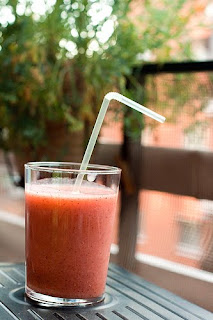I learned a couple of herbal poison ivy remedies in a Kitchen Herbs class I took a few years back. I don't have any feedback as to efficacy, so please add comments with your experiences.
There are two easily accessible Chinese herbs that treat poison ivy. Both are weeds that are ubiquitous in the summer. The first is Ge Gen, or Kudzu powder. You will find this in the macrobiotic section of natural foods stores. Ge Gen is the root of the kudzu vine, which grows over everything in the Southeastern United States: trees, bushes, signs and telephone poles.
You'll find the second in your backyard lawn: dandelion.
You can take dandelion and kudzu internally as a tea. Kudzu is a white powder, and can be used to thicken sauces. Use a tablespoon or so in a tea made with dandelion leaves. Drink several times a day. You can also use kudzu as a skin wash for legions (rash).
Dandelion can be steeped as a tea and added to bath water to sooth the skin. In Chinese herbal theory, dandelion clears heat and toxins, and hones to the Lung, which rules the skin. Poison ivy rashes are red and itchy, indicating heat toxins. You'll want a strong tea for this purpose. Fill the pot with the leaves, cover with water and steep for 30 minutes or so.
Ge Gen, or kudzu releases the exterior. Chinese herbalists also use Ge Gen to relieve neck and shoulder pain, especially associated with colds or cold weather.
Jewel weed grows in the Southeast and is also used to treat poison ivy, though not a Chinese herb. Mash the stems and rub the juice on the skin to sooth outbreaks, or as a preventative before or after possible exposure, as demonstrated in this You Tube video. KB
photo: Muffit, flickr creative commons 2.0








